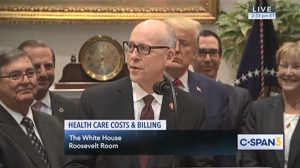Walden at White House: We Are Very Close to Legislating on Surprise Billing
Nov 18, 2019
In the News
WASHINGTON, DC – Energy and Commerce Republican Leader Greg Walden (R-OR) recently spoke at the White House and used the opportunity to discuss a health care priority that is bringing together Republicans and Democrats in Congress and President Trump: protecting patients from surprise medical billing.
"We should have the right to know what these things cost. I was here with you when you talked about surprise medical billing," Walden said to President Trump. "We are very close to legislating on that, Mr. President, and that is a huge win for consumers."

CLICK HERE to view Walden's remarks at the White House
Walden's remarks make clear that Congress is making progress to stop surprise billing. Committee leaders from the House and Senate are meeting regularly to determine the path forward to achieve our shared goal: legislation that can pass both chambers, and be signed into law to end surprise billing.
There is broad agreement on the major tenets of surprise billing legislation, which President Trump has also signaled he supports.
The goal has always been to include the bill in a larger year-end spending package because our surprise billing proposal saves billions over 10 years, savings that will lower health care costs for Americans. As Walden said at the White House, that goal is well within reach.
This comes as recent reports suggest that public support for Congressional action to end surprise billing continues to grow, and that the most vulnerable Americans are being hit by surprise medical bills. Read more below ?
Vox: Americans overwhelmingly support legislation to fix surprise medical bills
https://www.vox.com/policy-and-politics/2019/11/13/20961663/poll-stop-surprise-medical-bills-legislation
November 13, 2019
...
The problem of surprise medical bills has become a major focus for the public and lawmakers after reporting by Vox and other news outlets highlighted how people can be hit by unexpected bills for tens of thousands of dollars when they visit the hospital, often for emergencies, and end up receiving some services from a health care provider not covered by their insurance plan.
The public wants the issue addressed. According to the new survey, 88 percent of voters said they support Congress passing legislation to protect patients from surprise medical bills. Strong majorities of Democrats, independents, and Republicans said they backed such a proposal.
Voters said they want patients to be held harmless for surprise bills (86 percent strongly or somewhat support) and they were okay with doctors and hospitals being paid less than they are now if surprise billing is banned (82 percent strongly or somewhat support).
...
Click here to read more.
Reuters: Hospital sticker prices can rise faster than inflation
https://www.reuters.com/article/us-health-emergency-billing/hospital-sticker-prices-can-rise-faster-than-inflation-idUSKBN1XL2MG
November 11, 2019
U.S. hospitals’ sticker prices for two common sources of surprise medical bills have climbed far faster than economic inflation, a new study suggests.
Researchers focused on so-called chargemaster rates, or sticker prices, for two services that are often the source of surprise medical bills for patients - emergency medicine and anesthesiology. Patients with insurance usually pay only a small fraction of chargemaster rates, but people who lack insurance or receive care from out-of-network physicians may be billed at these higher rates.
...
“These findings are particularly worrisome given that the incidence of emergency department surprise medical bills increased from 32% to 43% between 2010 and 2016, leading to greater patient financial liability,” Dr. Tim Xu of Johns Hopkins University School of Medicine in Baltimore and colleagues write in JAMA Internal Medicine.
“Patients can face legal action and wage garnishments if they are unable to pay these excessive prices,” Xu and colleagues write.
The analysis included 2,042 hospitals from all 50 U.S. states. Overall, 18% were for-profit hospitals; 20% of the hospitals in the study had a high proportion of uninsured patients.
In 2014, chargemaster rates for emergency medicine were 3.9 times higher than Medicare rates. By the end of the study they were 5.1 times higher than Medicare rates.
For anesthesiology, chargemaster rates were 6.1 times higher than Medicare rates at the start of the study and 7.4 times higher by the end.
...
Click here to read more.